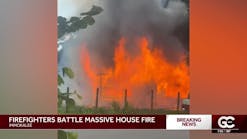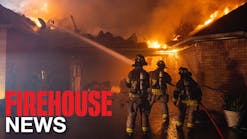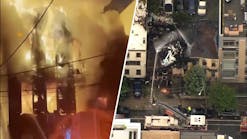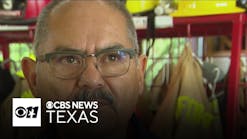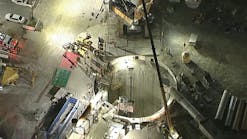PORT ARTHUR, Texas (AP) -- With promises of state and federal relief unanswered four days after Hurricane Rita, residents of this hard-hit Gulf Coast community blame bureaucracy as they cope without power, fuel, water or sewers.
Request for paperwork greet pleas for state and federal relief, said John Owens, the city's emergency management coordinator and deputy police chief. ''How the hell can we get paperwork to you when we don't have electricity?'' he asked Tuesday.
Food, gas and generator donations from private industries, not the government, allowed the city to sustain itself, Owens said. Two tanks of diesel fuel and gas for emergency vehicles represent the only federal provisions, supplies that lasted six hours, he said.
''We have been living like cavemen, sleeping in cars, doing bodily functions outside,'' he said. ''And meanwhile we're the victims, and we have families here.''
Mayor Oscar Ortiz, his home destroyed by fire after the hurricane, said ''we've had 101 promises'' for aid, ''but it's all bureaucracy.''
Ortiz and other officials in this oil-reliant town of 57,000 _ located about 10 miles northwest of where Rita came ashore early Saturday _ gathered at a Holiday Inn that was converted to a command center. A dirty, torn U.S. flag found amid the hurricane debris was tacked to the wall.
In Beaumont, another heavily hit area, state officials briefed President Bush, Texas Gov. Rick Perry at his side, on relief efforts. Perry later visited Port Arthur, and told local officials it could be up to two weeks before residents are allowed back home.
The governor cautioned people against criticizing government response time.
''There's always going to be those discombobulations, but the fact is everyone is doing everything possible to restore power back to this area,'' Perry said.
The governor said 15,000 workers were on their way to Southeast Texas as part of a goal to restore power to critical services _ fire, police, hospitals _ within a week. There are plans for cruise ships to provide power, and trains are bringing fuel to the area.
Nine base camps throughout the affected area were established as staging areas for energy workers so that they can work around-the-clock on essential tasks, including getting power lines back up and cleaning up brush, Perry said.
Ortiz said he was more hopeful about aid after spending about 30 minutes with the governor. He warned residents to stay away until the city got back on its feet.
''If residents come in now, they just compound the problem. We love our people in Port Arthur, but we can't have them come in,'' he said.
Water and sewer systems weren't expected to function until more generators arrived to bring them back on line. It could take up to a month to get electricity restored to the estimated 476,000 customers in the region.
About 2,000 residents who stayed through the storm were advised to find other places to live until utility services are restored. Authorities are providing transportation to shelters to those who need it.
In a neighborhood not far from a grocery store that reeked of rotten food, three FEMA semitrailers delivered ice, ready-to-eat meals and water late Tuesday afternoon.
Lee Smith, 50, and David Lee Adams, 49, packed their car with supplies to survive a few more days at their home.
''Without these trucks here, I don't think we would have made it,'' Smith said. ''I've never left before. I thought it wouldn't be too bad. The good Lord spared us.''
Houses in the neighborhood were mostly intact, although roofs had lost many of their shingles and yards were strewn with tree limbs. Windows in the grocery store were broken, and its sign was destroyed.
In Beaumont, a family of nine has been stuck in a hotel since the day before the storm hit. They left their home in Sulphur, La., in hopes of getting to Shreveport, La., but traffic was gridlocked so they headed for Beaumont, where their son manages the hotel.
They have no running water or electricity. They managed to get a generator and they hooked up a couple of fans and a lamp to it.
''We're lucky,'' said Claudia Church, 68. ''It's not been too bad. The main thing people are waiting for is gas, and there ain't any.''
She said authorities had stopped by to check on them and deliver prepackaged meals, ice and water, but she has heard they won't be able to go home for a month. ''That's what we've heard. I hope not,'' she said.
Meanwhile in Orange, a steady stream of more than 100 cars and trucks snaked outside a shopping strip hammered by Hurricane Rita for supplies of food, water and ice organized by the Compassion Alliance, a Nixa, Mo.-based private disaster assistance group also helped by church organizations and FEMA.
In temperatures near 100 degrees, Texas National Guard troops loaded the vehicles with as many items they could hold.
''They're so happy to see us,'' said Jon Manderscheid, with the Compassion Alliance. The group, which also assisted Katrina victims in Biloxi, Miss., showed up two days ago with three semi-truck trailers filled with food and water and ice and has been running non-stop since. About a dozen semi-trucks were in the parking lot Tuesday and the line of cars efficiently moved from station to station.
Manderscheid said the group would continue to work until about 90 percent of the people had power restored.
''I know it's going to take some time, but we really appreciate this,'' Dorothy Landry, 66, of Orange said, after waiting in the line. ''I can't thank them enough.''
Other signs of improvement Tuesday: At least one service station in Vidor, just east of Beaumont, had gas and power. A Sam's Club store in Beaumont also was open and its fuel pumps were lined up with cars getting gas.
____
Associated Press reporter Michael Graczyk in Beaumont contributed to this report.
